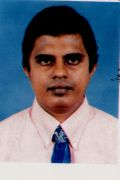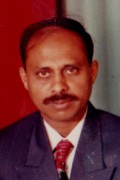IDEAS
View More Messages from IDEAS Alumni

Ms. Frances P’ann Macabuhay (19th Overseas Fellow)
Account Management Specialist, Institutional Banking and Subsidiaries Sector, Land Bank of the Philippines

Mr. Sheikh Mohammed Tauhidul Islam (19th Overseas Fellow)
Upazila Nirbahi Officer (Chief executive of the sub-district), Saturia Upazila, Manikgonj District, Ministry of Land, Bangladesh

Endera Arachcchige Rathnaseela (13th class of Overseas Fellows)
Assistant Director
Department of Fiscal Policy & Economic Affairs
Ministry of Finance and Planning
Sri Lanka

Thida Chaw Hlaing (12th class of Overseas Fellow)
Assistant Program Officer
ASEAN Unit, Department of Agricultural Planning
Ministry of Agriculture and Irrigation
Myanmar

Md. Nazmuddin (11th class of Overseas Fellow)
Indian Economic Services, Senior Research Officer
Planning Commission
Government of India
Ms. Frances P’ann Macabuhay(19th Overseas Fellow)
Account Management Specialist, Institutional Banking and Subsidiaries Sector, Land Bank of the Philippines
The well rounded curriculum at IDE Advanced School enables fellows to simultaneously appreciate the socio-economic development issues facing developing countries while experiencing Japanese culture. Experienced and competent lecturers and the learning environment in the school make it conducive for the fellows to be more perceptive to new ideas. On top of the classroom lectures, activities set by the ever-accommodating Secretariat enable the fellows to witness the actual application of the lectures imparted in class. The diversity of the nationalities of the participants adds dynamism to the program. Interactions among the Asian fellows provide first hand information about the actual developmental experiences and concerns in their countries.
Outside the classroom setting, the camaraderie among Overseas and Japanese fellows is felt. Cooking parties, casual get-togethers and excursions sealed the bond among them. The friendship forged is definitely one of the priceless memories I’ll forever cherish.
Mr. Sheikh Mohammed Tauhidul Islam(19th Overseas Fellow)
Upazila Nirbahi Officer (Chief executive of the sub-district), Saturia Upazila, Manikgonj District, Ministry of Land, Bangladesh
IDE Advance School (IDEAS) offer an ideal international environment and ample services for study and research. The main purpose of IDEAS is to impart training in the field of economic development and contemporary studies which are very appropriate for understanding today’s globalizing world. IDEAS has a clear vision for long-term capacity building. It is helping people who work in the public sector to enhance their knowledge and skills to improve public services especially in developing countries.
IDEAS faculty is extremely diverse. Professors come from different backgrounds and have been educated in different places with experience working in many parts of the world. The Institute has a world class and well-organized library with every modern facility.
The Institute provides the basic Japanese language training and some international exchange program like the Japanese Tea Ceremony and the Japanese calligraphy. We have also got a nice experience of home stay with Japanese family to exchange culture and tradition. These undoubtedly give fellows distinct advantage.
If you are looking for an environment in which to grow academically, professionally and personally, IDEAS is the place to be.
Endera Arachcchige Rathnaseela (13th class of Overseas Fellow)
Assistant Director
Department of Fiscal Policy & Economic Affairs
Ministry of Finance and Planning
Sril Lanka
I am still shocked whenever, I recall 26th December 2004, the fateful day, Sri Lanka was hit by worst ever disaster in the history. Tsunami tidal waves took the lives of more than 37,000 Sri Lankans including several hundred foreigners while, another several thousands of people still gone missing. The damage on property along the coastal belt was estimated to be in excess of US $ 3 bn.
Until this fateful day of Tsunami, Sri Lanka has never experienced a natural devastation of this magnitude. Other than seasonal floods which occur as a result of heavy monsoon rains,Sri Lankans were never heard of natural disasters like earth quakes tidal waves. Even though, sea is normally rough during low and high tides, these tides were never dangerous enough to cause any harm to life or property.
On the day of tsunami, being a holiday, I was at my hometown situated close to the Southern Port city of 'Galle'. While I was reading the paper, at about 9.25 in the morning, I heard warningsbroadcasted on all radio and television channels of 'tidal waves'. However, initially most were not so serious about warnings, since we never believed country to be hit by tidal waives of suchmagnitude.Little later, when we see the tragedy from our own eyes, we could not believe our own eyes. Dead bodies of thousands of people were laid every where. The scene of people weeping beside dead bodies oftheir loved ones, especially parents who lost their kids was very emotional be seen. We could not resist,breaking down ourselveswatching the pathetic scene. Suddenly, I remembered my last yearvisit to Hiroshima Museum,where sufferings of thousands of Japanese people were affected by atomic bomb was very emotionally depicted.
Badly affected from the tsunami disaster were fisheries and tourism sectors. More than 60% of the fishing boats including 8 major fishing harbours out of total12 were seriously damaged. Large number of tourist hotels along the coast were also seriously damaged. In addition, the damage on housing, infrastructure and other industries along the coastal areas amounts to several billions of US dollars.
However, quick response received from international community to tackle the crisis situation was unbelievable. Rescue teams from around the world arrived in to the country within 24 hours after tsunami with emergencyassistance. So far Sri Lanka has received more than sufficient emergency relief supplies from all over the world which included food, medical supplies, and many other items. For speedy channeling of relief supplies to the victims, government has set up specialized units at Colombo Port and Airport to clear cargo.
Several heads of the governments, including UN Secretary General visited the country during the hour of need, showing their solidarity with Sri Lanka. So for international community has pledged more than US$ 4 billion for post tsunami rehabilitation work and to re-vitalize the economy. Japan , being the single largest bilateral donor to Sri Lanka, has again showed her committementfor Sri Lankan people bysharing the majorportion ofthese pledges.
Most of the vital infrastructure facilities which were damaged by tsunami disaster have already bee restored. Currently the immediate challenge for the government is to build housing for the people who are currently living in temporary camps. More than 30,000 houses have been badly damaged while, several thousandwere partly damaged. Government has set up a special task force(TAFREN) to co-ordinate post tsunami rehabilitation work between government and non government agencies. A separate NGOSecretariat has also been established to facilitate as well as to monitor activities of numerousNGO’s who are engaged in relief work. Until April this year, most of the relief items have been made tax free.
Most of the Sri Lankans are very much determined to see their future positively,and to start fresh lives from the very beginning. Unless it is forheavy death toll, some consider tsunami disaster as a blessing in disguise, since now people have to recognize the importance of protectingthe nature. Until now,they have the least respect for nature, they were destroying beautiful coral reefs as well asforest cover along the coastal beltfor cheap economic gains.
As a past student of IDEAS,I humbly request you all to think of selecting Sri Lanka or any other tsunami affected country, as thedestination to spendyour next winter vacation, so that thereby you can support thebadly affected tourism industries in our countries.
Thida Chaw Hlaing (12th class of Overseas Fellow)
Assistant Program Officer, ASENA Unit, Department of Agricultural Planning, Ministry of Agriculture and Irrigation, Myanmar
IDE Advanced School (IDEAS) was founded in 1990 and is famous not only in Japan but also in various parts of the world, especially in Asian region. The main purpose of IDEAS is training frontier development specialists in the field of economic development and contemporary studies.
I am very grateful to be given a chance to study in IDEAS and to live in Japan. Because of IDEAS program, we had fruitfully upgraded our capacity on Economics, Finance and Trade. We gained a lot of knowledge from the intensive lectures and other subjects from IDEAS program. Some topics were new for us and some had broadened our understanding of micro and macroeconomics. We had learnt about NIEs, WTO, ASEAN, HRD and APEC in the context of globalization not only from Japanese professors but also from overseas professors of different universities and international organizations. I cannot imagine obtaining the knowledge of these matters as efficient as from my own studying. Now I know how politics and economy in postwar Japan is going on as well as Japanese International Trade Policy.
Out of intensive lectures, we had learnt some special lectures about social development role of World Bank, world cultural heritage and development, UNDP and some other issues from visiting professors of overseas Institutions and organization.
Field studies of IDEAS program were also very valuable and informative for all overseas fellows and Japanese students. Especially, we had the opportunity to the National Diet, Bank of Japan, Tokyo Stock Exchange, Nikko, Kyoto, Hiroshima and so on.
For the International Exchange Program, we had a good experience giving lectures at high schools in Chiba, kindly arranged by the Chiba Prefectural Government. We also got such a nice experience of home stay with Japanese family to exchange culture and tradition. The family warmly welcomed us. We felt that we got adopted-family in Japan.
Accommodation, arranged by IDEAS was also very ideal for overseas fellows. OVTA provided the basic Japanese language training and some international exchange program like the Japanese Tea Ceremony and Japanese calligraphy.
IDEAS is a great school of giving the advanced knowledge and good things in six month duration. I am sure that the acquired knowledge, provided by IDEAS program, will be valuable for every fellows/students to contribute in their respective countries and to advance their future career. All overseas fellows and Japanese students got the exceptional chance of learning and exchanging experiences and knowledge from each other. Finally, I would like to convey my sincere thanks to IDEAS on behalf of all overseas fellows and Japanese students. We highly appreciated the kind cooperation of IDEAS.
Md. Nazmuddin (11th class of Overseas Fellow)
Indian Economic Services, Senior Research Officer,
Planning Commission, Government of India
IDE Advanced School, established in 1990, is one the best training institute of the world. The purpose is to impart training in the field of economic development and more importantly in the area of economic co-operation. The participatory nature of the training impressed me and I feel privileged and honored to have attended the training program offered by the Institute.
The Institute offers six-month training to the overseas participants. It provides exposures on subjects that range from basic economic concepts to contemporary regional and global issues. The course covers theories of economics growth and project appraisal techniques. In addition, theoretical and practical aspect of Japanese economic development is also taught. The unique pattern of development of Japanese economy has been termed as catch-up type of industrialization. This pattern has also been observed in NIEs and ASEAN countries. Various field studies during training enable participants to understand Japanese economic development in proper perspective. The catch up type of industrialization as a development model also has relevance in other developing countries of the world too.The process of globalization is irreversible. Therefore exposure to regional and global issues like ASEAN, APEC and WTO enable participants to better equip themselves for the challenge of globalization.Faculty of the Institute consists of internationally recognized experts in various fields. The Institute has a world class and more importantly well-organized library that has a rich collections of books and periodicals on various subjects. Computer and photocopy facilities are excellent. Therefore for policy makers, researchers as well as academicians, the Institute offers an ideal setting and excellent opportunity for enhancing their intellectual capabilities.
Overseas fellows and Japanese students belong to diverse socio-economic background. The training program provides them a rare opportunity of interaction and learning from each other's experience. The program also provides adequate opportunity to learn basics of Japanese language.IDEAS staffs are also extremely polite and co-operative which makes one feel homely during the stay in Japan. Presence of Japanese students makes life of overseas fellows easier and comfortable. Accommodation facilities at OVTA is superb. IDEAS is not simply a training institution, it is a movement. My message, therefore is let us make this movement for the betterment of all human beings.
